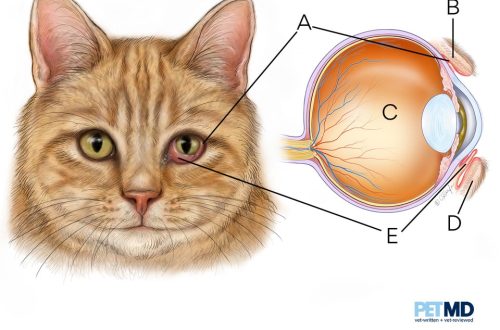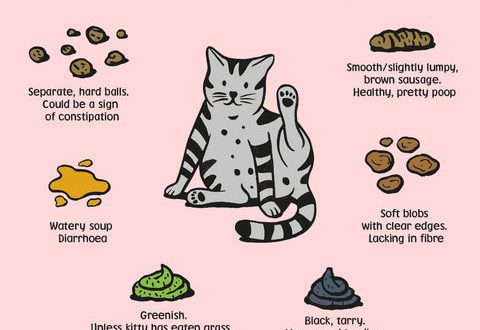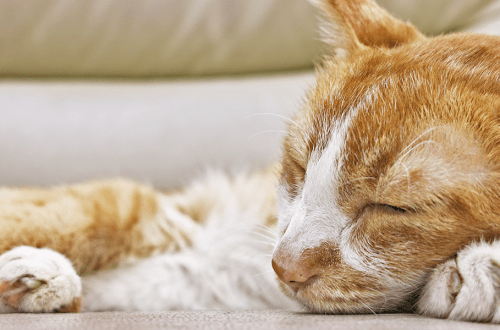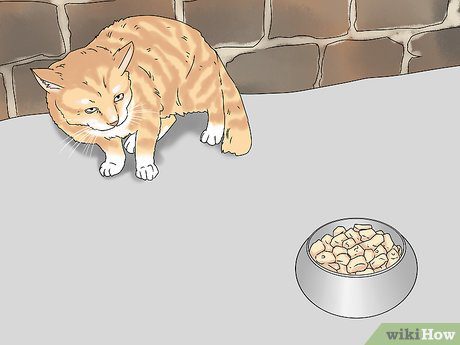
Diarrhea with blood in cats – causes and what to do?
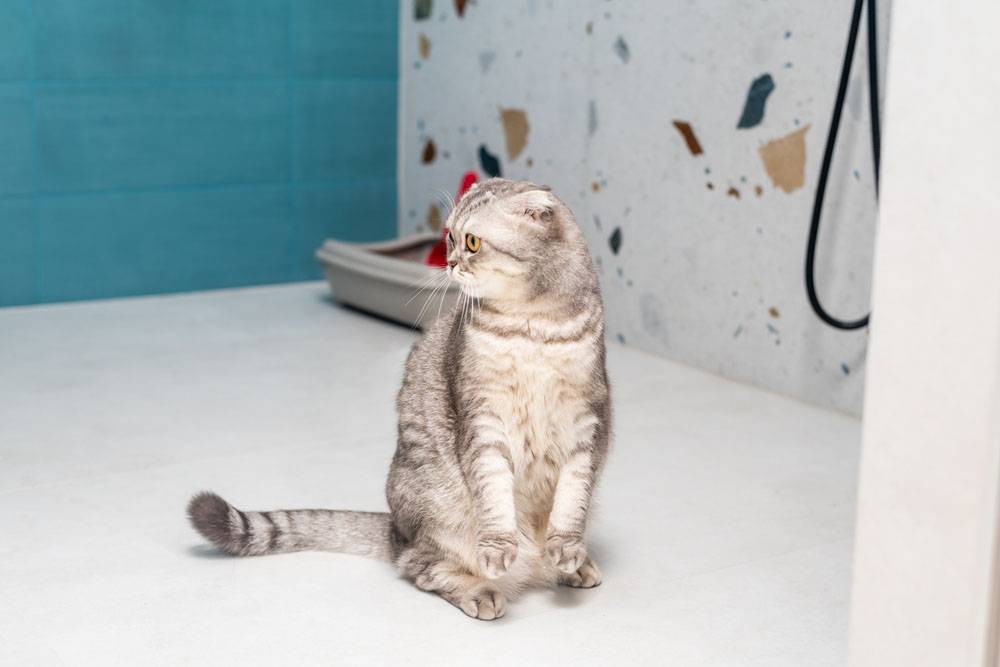
Contents
Causes of loose stools with blood in cats
Finding out the cause of bloody diarrhea in a cat is the first step towards a cure. Below are the most common factors that can cause this condition.
Infectious diseases
Infections such as panleukopenia, coronavirus enteritis are widespread among cats. Viruses infect intestinal cells, causing severe inflammation and, as a result, diarrhea.
Parasitic diseases
Intestinal parasites are both helminths (round, tapeworms) and protozoa (isospores, giardia, cryptosporidium, etc.). Both those and others, with active reproduction in the intestine, cause damage to the wall, inflammation.
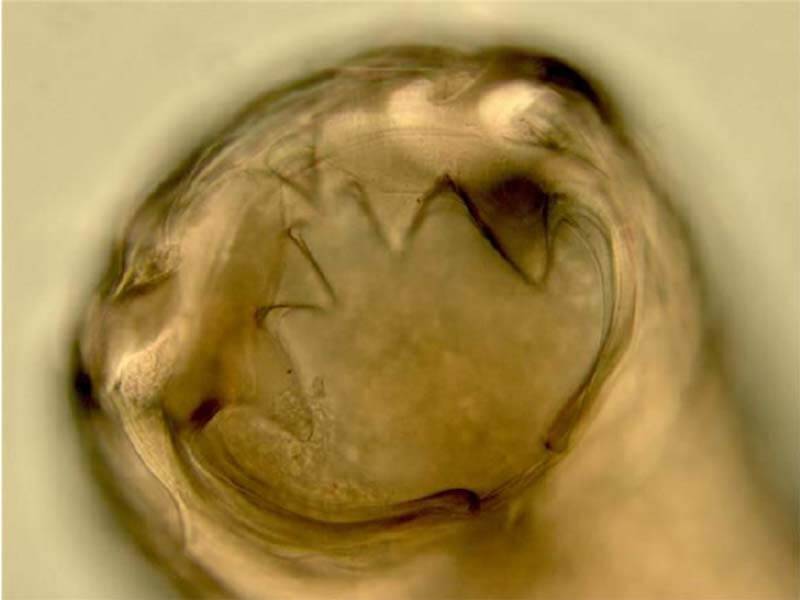
www.researchgate.net
food stress
Any deviation from the recommended norms in feeding a cat can lead to problems with stool. This includes the consumption of a new food for a pet, and a sharp transition from one food to another, and eating inappropriate food (bones, smoked meats, butter, etc.). All this can lead to diarrhea and hematochezia, that is, the appearance of blood in the stool.
Poisoning
There are many different substances that cause poisoning, damage to the gastrointestinal tract (GIT), which can manifest as bloody diarrhea in a cat.
Among them are:
Plants (tulips, aloe, etc.).
Certain human and veterinary medicines. A toxic effect can have both the drug itself, taken in any amount, and an overdose of some other drugs (for example, non-steroidal anti-inflammatory drugs, especially with the active ingredients ibuprofen and paracetamol).
Zoocoumarins are substances designed to fight mice and rats. When poisoned by them, there is a violation of blood clotting and internal bleeding.
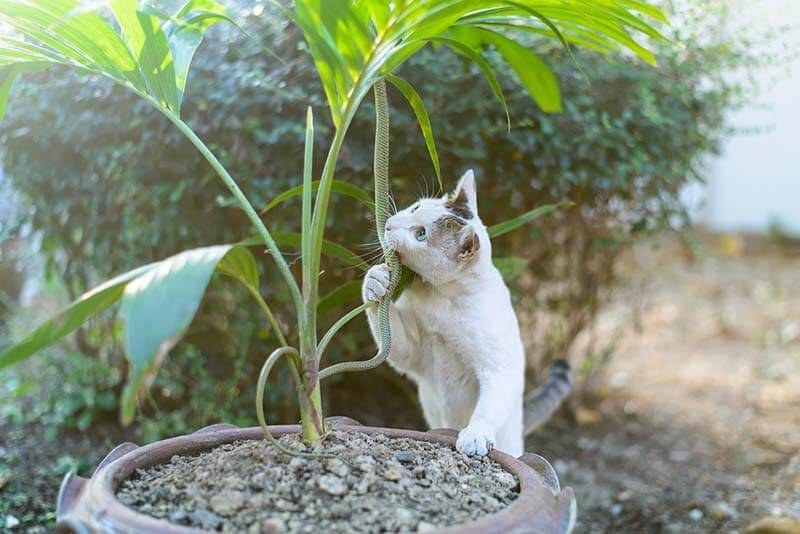
inflammatory bowel disease
Inflammatory bowel disease (IBD) is a collective term applied to a group of chronic enteropathies characterized by persistent or recurrent GI symptoms.
Neoplasms, polyps
Most often found in older animals, but young animals are no exception. Many neoplasms in the intestine are prone to ulceration and bleeding, as well as impaired digestive function. They can be either benign or malignant in nature.
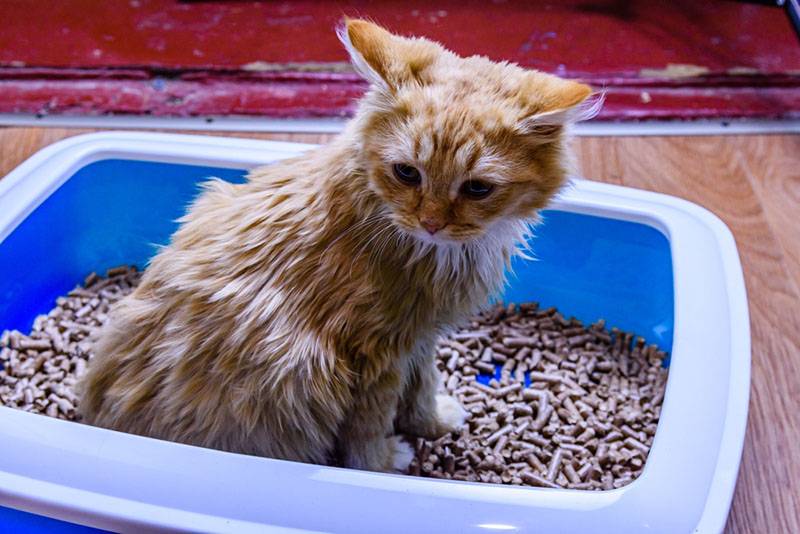
Additional symptoms
Given that diarrhea with blood can be a manifestation of many diseases in animals, veterinarians and owners can observe other symptoms in a pet.
Mucus in stool. In a small amount, it is always present in feces. But with inflammation of the intestine, its abundant formation is noted.
Increased body temperature. It is registered mainly in infectious diseases.
Vomiting. Often, diarrhea with blood in a cat accompanies vomiting, which occurs due to damage to the stomach, intestines, liver or pancreas.
Pain discomfort. Sometimes it can be quite difficult to determine the presence of pain in a cat. Often this is manifested by a tense stomach, excessive aggression, the cat hides all the time.
Loss of appetite, weight loss. These are related symptoms. Since pain discomfort, fever, vomiting are common in diseases of the gastrointestinal tract, the pet loses its appetite and, as a result, weight loss is noted.
Lethargy. Lethargy in sick animals occurs against the background of starvation, elevated body temperature, pain from the internal organs.
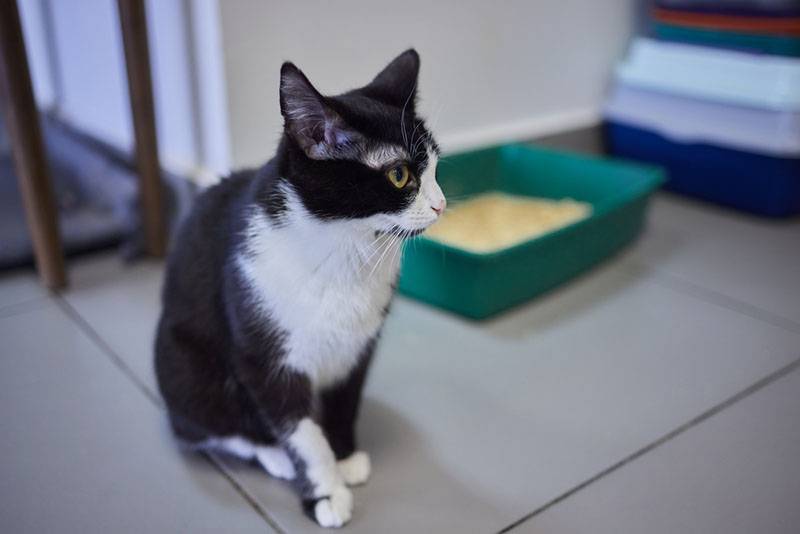
Diagnostics
Everything always starts with collecting a detailed history: what the pet is fed, when it was dewormed, vaccinated, whether there are chronic diseases, etc.
Next, proceed to the inspection. According to its results, the veterinarian may need laboratory and instrumental methods of research.
To determine the presence of infection, inflammation, anemia and platelet count, a hematological blood test is performed. A biochemical study of blood serum is used to assess the general health and function of various abdominal organs.
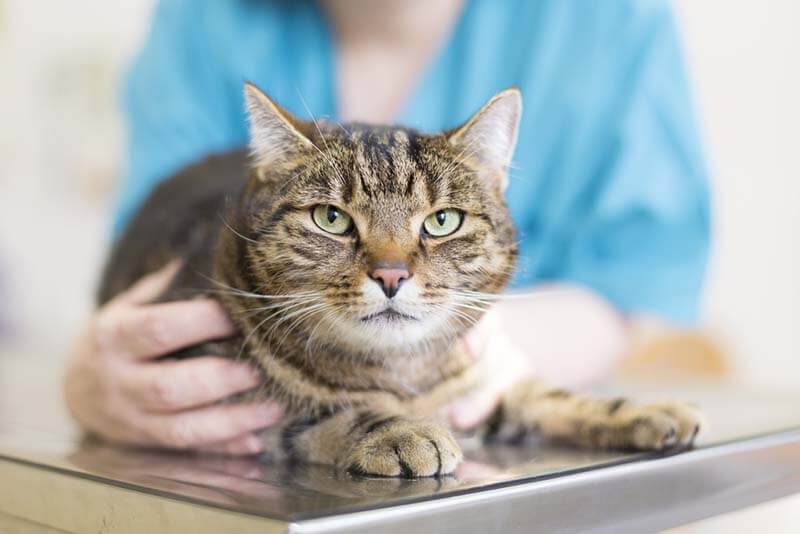
The presence of foreign objects, neoplasms in the gastrointestinal tract is excluded using radiography, ultrasound examination of the abdominal cavity. If tumors are found, then a biopsy or its complete removal with subsequent histological examination will be additionally required.
Parasitic diseases are diagnosed by fecal analysis, which allows you to find eggs of helminths and some protozoa. In addition, PCR diagnostics are used to detect protozoa, as well as bacterial and viral infections.
The diagnosis of IBD is made by exclusion, using the above diagnostic methods and histological examination of the area of the intestinal mucosa.
How to treat bloody diarrhea in cats?
Regardless of the general well-being of the pet, the appearance of a loose stool with blood in a cat requires an in-person consultation with a veterinarian, because this symptom occurs for various reasons, and delay in treatment can lead to sad consequences.
What can you do at home?
At home, a bloody cat can be provided with special therapeutic diets for animals with gastrointestinal problems and provide fresh water, as well as create a calm environment.
But you can not self-medicate!
Do not wait for the cat’s condition to improve and everything will pass. Before visiting the clinic, the owner needs to prepare a pet’s veterinary passport, as well as be prepared for a detailed description of the entire situation. You can take a picture or collect and bring a stool sample to show to a specialist.
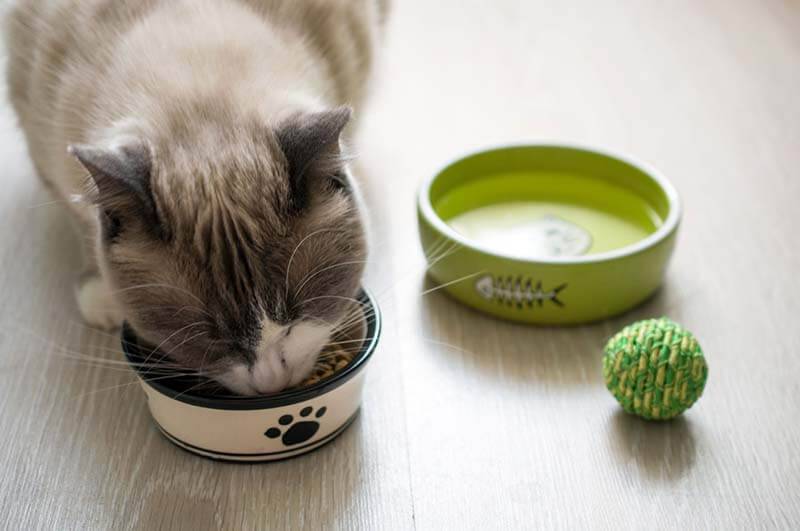
Veterinary treatment
If the loose stool in a cat with blood is caused by parasites, a series of treatments with antiparasitic agents is prescribed.
In case of intestinal injuries, the presence of neoplasms or foreign objects, surgical treatment is used. After diagnosing the tumor, the doctor may prescribe a course of chemotherapy.
For infectious diseases, symptomatic treatment is prescribed depending on the condition of the pet: intravenous infusions, antibacterial drugs, gastroprotectors (that is, agents that have a protective effect on the mucous membrane of the stomach and intestines), antiemetics, antipyretics, painkillers, etc.
If poisoning is suspected, symptomatic treatment and an antidote, if available, are mainly used.
With a large blood loss, animals develop anemia, and in this case, a transfusion of donor blood may be required.
In IBD, a diet with hydrolyzed (split) protein is used, and it is also possible to use antibiotic therapy, immunosuppressive drugs, that is, suppressing the immune system.
With food intolerance, as well as in the treatment of other causes, special diets based on protein hydrolyzate for sensitive digestion are often used. The presented feeds are easily digested, and also help to restore the intestinal mucosa.
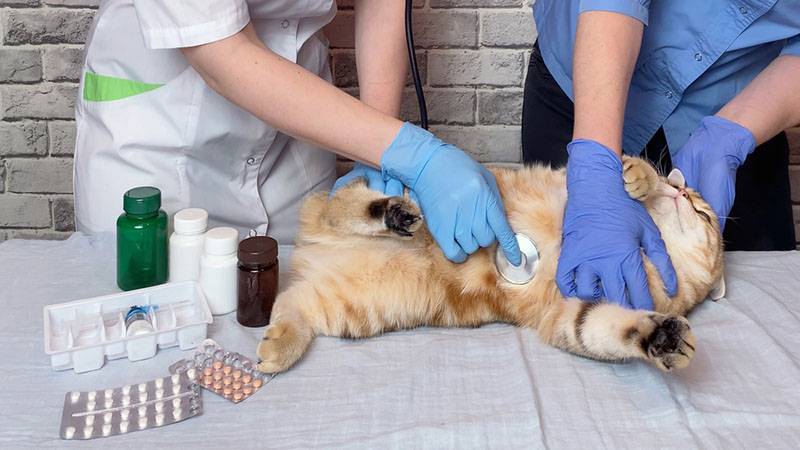
Bloody diarrhea in kittens
If a kitten has loose, bloody stools, it is important to contact your veterinarian for advice as soon as possible, especially if he refuses to eat and is lethargic.
The most common causes of diarrhea with blood in a kitten are parasites (helminths, protozoa (giardia, cryptosporidium, isospores), infectious diseases (panleukopenia)), malnutrition. Treatment tactics will be similar to adult animals. The main danger of the described symptoms is that such feces remove a large amount of fluid from the body along with nutrients. And this, in turn, leads to dehydration, deterioration of the performance of all organs and tissues, which is detrimental to young animals.
Prevention
Not all of the causes described in the article can be prevented. However, it is possible to reduce the likelihood of a cat having loose stools with blood if the following recommendations are followed:
Regular deworming, even if the cat eats only dry food and does not leave the house anywhere. It is recommended to treat kittens up to 6 months of age once a month, then, like adults, at least once a quarter. To date, there is a large selection of antiparasitic drugs in the form of tablets, drops at the withers. Some of them have only an anthelmintic effect, but there are also combined preparations that also protect against external parasites (fleas, ticks, etc.).
Annual vaccination against infectious diseases (panleukopenia, calicivirus, herpesvirosis, rabies, etc.).
Balanced, proper nutrition. It is strictly forbidden to let animals eat chicken and fish bones, which can easily choke and injure the esophagus, stomach or intestines and cause bloody diarrhea in the cat. If the owner does not want to feed the pet with industrial foods or wants to mix them with a natural diet, it is best to seek the advice of a veterinary nutritionist to draw up a nutrition plan.
Annual preventive examinations by a veterinarian with the minimum necessary diagnostics, that is, clinical examination. This will allow early detection and treatment of various health problems.
Remove all plants, small foreign objects, medicines, chemicals from the cat’s access area so that the pet does not eat them.
It is advisable not to allow free-range cats without supervision. On the street, they can get poisoned, contract infectious diseases, fight with other animals.
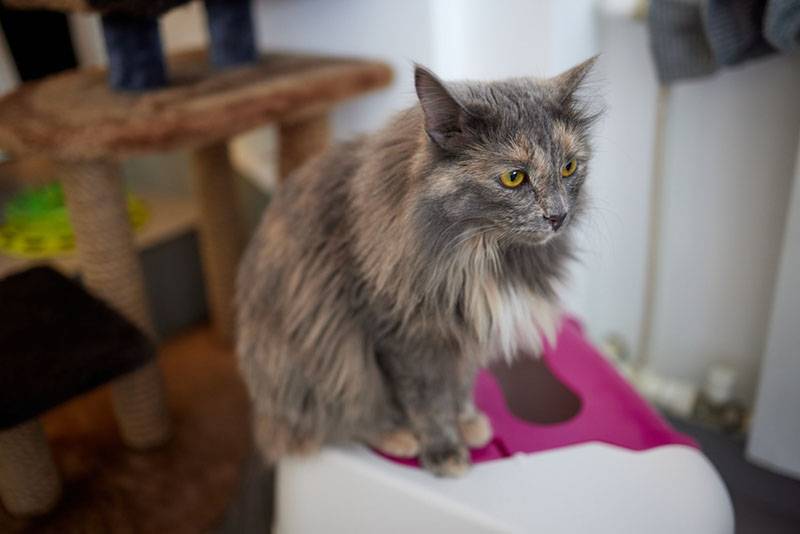
If the cat has loose stools with blood: the main thing
Diarrhea with blood in a cat can occur for various reasons: infections, parasites, poisoning, etc.
No need to self-medicate. The tactics of treatment depend on the cause of the disease: for example, antiparasitic drugs are used for helminths and protozoa, if foreign objects are found in the gastrointestinal tract, tumors, they are removed surgically, etc.
For the prevention of some causes, it is necessary to ensure proper nutrition, timely treatment against parasites, and vaccination.
To prevent poisoning, it is necessary to remove plants, medicines, and various chemicals from the cat’s access area.
Answers to frequently asked questions
Sources:
Hall E., Simpson J., Williams D. Gastroenterology in dogs and cats, 2010.
Spielman B. «Hematochezia (blood in stool) in cats», 2015 // https://www.petplace.com/article/cats/pet-health/hematochezia-blood-in-stool-in-cats/
«Bloody Diarrhea in Cats: When it’s an Emergency», 2021 // https://www.veterinarians.org/bloody-diarrhea-in-cats/
Washabau R. J., Day M. J. «Canine and Feline Gastroenterology», 2013.



